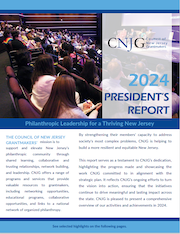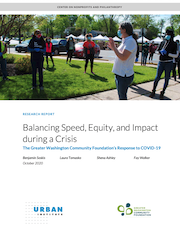Site Search
- resource provided by the Forum Network Knowledgebase.
Search Tip: Search with " " to find exact matches.
This presentation will focus on the potential impact of federal healthcare policy changes on coverage and access to care in New Jersey. We will discuss changes under consideration by the current Presidential administration and the 119th Congress, including adjustments to program financing, eligibility, and other policy requirements, with potential broad implications for state Medicaid and Marketplace programs. Heather Howard, will provide an overview of the potential federal policy changes, vehicles for advancing and anticipated timing of such changes, and implications for New Jersey funders and nonprofits.
Heather Howard is a Professor of the Practice at Princeton University’s School of Public and International Affairs, where she co-directs the Global Health Program and is a faculty affiliate of the Center for Health & Wellbeing. She is also director of the State Health and Value Strategies program, a Robert Wood Johnson Foundation-funded program focused on assisting states with transforming their health care systems to be affordable, equitable and innovative. She served as New Jersey’s Commissioner of Health and Senior Services from 2008-2010. She also has significant federal experience, having worked as Senator Jon Corzine's Chief of Staff, as Associate Director of the White House Domestic Policy Council and Senior Policy Advisor for First Lady Hillary Clinton, as an Honors Attorney in the U.S. Department of Justice's Antitrust Division Health Care Task Force, and for the U.S. Representative Nita Lowey (D-NY). She received her B.A. from Duke University and her J.D. from NYU School of Law.
Cost: Free for CNJG Members; $75 for Non Member Grantmakers
This program is only open to staff and trustees from grantmaking organizations.
Programs in this Series:
March 13: Making Sense of Federal Policy: Understanding What it Means for NJ: Immigration
March 20: Making Sense of Federal Policy: Understanding What it Means for NJ: Health
March 27: Making Sense of Federal Policy: Understanding What it Means for NJ: Environment
April 3: Making Sense of Federal Policy: Understanding What it Means for NJ: Education
April 10: Making Sense of Federal Policy: Understanding What it Means for NJ: Housing
April 17: Making Sense of Federal Policy: Understanding What it Means for NJ: Media & Journalism
April 24: Making Sense of Federal Policy: Understanding What it Means for NJ: Arts
Webinar Video
Op-Ed: The Affordable Care Act at 15 years old — successful, but facing challenges - Heather Howard, Rachel Morrow - March 24, 2025
The presence of lead in New Jersey, whether in drinking water, paint, or soil, is one of many environmental justice issues that disproportionately affect low-income communities and communities of color. This funder briefing for all funders in New Jersey will cover how lead affects New Jersesyans, where it comes from, as well as local solutions, success stories, and partners to help communities equitably remove lead. Panelists will also discuss what funders can do in partnership with local governments to address the issue, including understanding new state mandates for lead pipe replacement and lead paint inspections and remediation.
Speakers:
Deandrah Cameron, New Jersey Future
Ruth Ann Norton, Green and Healthy Homes Initiative
Heather Sorge, Lead-Free NJ
Shereyl Snider, East Trenton Collaborative
Moderator: Anthony Diaz, Newark Water Coalition
Cost: Free for CNJG Members; $50 for Non Member Grantmakers
This program is only open to staff and trustees from grantmaking organizations.
Deandrah Cameron
Deandrah develops and advances state policies that affect health, water infrastructure, and redevelopment, with a primary focus on lead in drinking water. Prior to joining New Jersey Future, Deandrah worked as a case investigator at the Monmouth County Health Department to prevent the spread of COVID-19. Deandrah holds a B.S. in Public Health from the Edward J. Bloustein School of Planning and Public Policy, as well as a Master of Public Health focused on Health Systems and Policy with a Graduate Certificate in Public Health Nutrition from the Rutgers School of Public Health.
Ruth Ann Norton
Ruth Ann Norton, President & CEO of the Green & Healthy Homes Initiative, joined the organization in 1993 and has led its development into one of the nation’s most effective and foremost authorities on healthy housing and its impact on the social determinants of health. GHHI is dedicated to addressing the social determinants of health and racial equity through healthy housing. An expert on lead poisoning prevention, healthy housing and the intersection of climate, energy and health, Ruth Ann directs GHHI’s national strategy, policy framework and services to integrate climate, healthcare and healthy housing as a platform for improved health, economic, educational and social outcomes for low-income communities.
Heather Sorge
Heather is the Lead-Free NJ program manager and oversees its day-to-day operations. Lead-Free NJ is a new inclusive and equitable collaborative focused on addressing lead hazards and preventing childhood lead poisoning. Heather’s work is centered on facilitating a diverse statewide network that hopes to ultimately ensure the eradication of childhood lead poisoning in New Jersey within 10 years. Prior to joining New Jersey Future, Heather was the organizer for Healthy Schools Now with the New Jersey Work Environment Council (WEC), a coalition of over 80 organizations representing a diverse set of stakeholders dedicated to ensuring all New Jersey children and school employees learn and work in safe, healthy, modernized school buildings. Heather graduated from Churchman Business School with a degree in Accounting Finance.
Shereyl Snider
Shereyl Snider joined the East Trenton Collaborative (ETC) in 2019 as a Community Organizer. Originally a New Yorker, she has lived in East Trenton since 2003. As an ETC staff member, Shereyl provides dynamic leadership, amplifies the voices of the marginalized, facilitates collaboration among individuals from diverse backgrounds, and develops a robust commercial and residential community. After moving to Trenton, she earned an associate’s degree in Early Child Care from Mercer County Community College and worked as a substitute teacher in the Hamilton School District for five years. As a neighborhood resident and volunteer at the ETC, she learned how to organize in her local community. In addition to her work in the East Trenton neighborhood, Shereyl is also a member of The City of Trenton American Rescue Plan Committee championing for a lead safe Trenton.
Anthony Diaz, moderator
Anthony Diaz was born and raised in Newark, NJ where he currently resides and is the oldest of 4 boys. He is the co-founder and executive director of the Newark Water Coalition, an organization dedicated to raising awareness about the city's lead water crisis and other social justice issues. The Newark Water Coalition has given out over 100,000 gallons of water and over 90,000 lbs of food. He has traveled nationally and internationally to work on water issues on indigenous lands and rural communities. Anthony was able to represent Newark at the United Nations Climate Conference in Glasgow, Scotland. He believes that people power can win against the interconnected struggles of humanity. He is an avid Star Wars and Anime fan.
Webinar Video
Articles of Interest
Gov. Murphy announced grants for organizations ridding NJ of lead exposure
New Jersey will grant $38 million to lead abatement. Here’s where it will go.
New Jersey Lead Poisoning Prevention Action Plan
Jersey Water Works Lead in Drinking Water Task Force
Facts about Lead in the Home
Lead in Drinking Water, a Permanent Solution in New Jersey
Lead in Drinking Water in Child Care Facilities: Ensuring the Future for New Jersey’s Children
Lead Free NJ
East Trenton Collaborative
Newark Water Coalition
Green & Healthy Homes Initiative
Sample board committee descriptions, including roles and responsibilities of committee members
This weekly conference call series welcomed New Jersey-based grantmakers along with national funders and provided an opportunity for grantmakers to hear from a wide range of experts in the field of disaster philanthropy. Series 1 started on November 5, 2012, one week after Sandy struck New Jersey, and continued through March 25, 2013. Series 2 started on September 9, 2013 and concluded on November 4, 2013. The written compendium of the recordings is listed below.
The Council of New Jersey Grantmakers’ 2023 – 2027 Strategic Plan reimagines the future for CNJG. As a result of the extensive strategy development process, the plan includes a renewed vision, mission, core values, and goals. The work is informed by previous efforts, and current issues and trends impacting philanthropy and society.
The 2023 - 2027 Strategic Plan is a roadmap for the next five years, built upon CNJG's past strategic plans and learnings. We look forward to executing this plan, the additional learnings and opportunities it will bring, and delivering on these goals to move us into the future.
This weekly conference call series welcomed New Jersey-based grantmakers along with national funders and provided an opportunity for grantmakers to hear from a wide range of experts in the field of disaster philanthropy. This series started on November 5, 2012, one week after Sandy struck New Jersey, and continued through March 25, 2013. The written summaries of each recording are listed below.
- Frequent moves are the most significant barrier to academic success, as they disrupt both students and teachers. Students on the move need extra time and attention to get caught up, requiring teachers to spend more time with those students.
- Students who are unable to find stable shelter have difficulty meeting state or district mandates regarding the number of days they must attend school to stay enrolled.
- Often, the slow transfer of student records, along with differing course requirements from school to school, complicates the accrual of sufficient credits for homeless students to be promoted and receive a high school diploma.
Sample disaster preparedness and recovery plans for foundations.
"Co-Creation" is a case study about the Connecticut Early Childhood Funder Collaborative, a project of the Connecticut Council for Philanthropy. The case study, written by Patricia Bowie, examines co-creation, an emerging systems change collaboration model which grew out of a funder-and-state partnership. This unique partnership led to the creation by executive order of a new and independent Office of Early Childhood, which was formally approved by the Connecticut State Legislature in 2013. The companion piece, "Taking on New Roles to Address 21st Century Problems," looks at co-creation from the perspective of a regional association of grantmakers.
The Connecticut Early Childhood Funder Collaborative comprises 14 funders from around the state who bring many years of experience in supporting and operating programs that serve the needs of children and families.
How the government can partner with impact investors to unleash new capital, talent and energy for maximum impact.
This weekly conference call series welcomed New Jersey-based grantmakers along with national funders and provided an opportunity for grantmakers to hear from a wide range of experts in the field of disaster philanthropy. This series started on September 9, 2013 and concluded on November 4, 2013. The written summaries of each recording are listed below.
The Newark Philanthropic Liaison is a unique partnership between the Council of New Jersey Grantmakers and the City of Newark, supported by several foundations. Read more about the Liaison’s work In these reports. Due to several transitions, there were no written reports between 2015 and 2022.
The Ford Institute for Community Building, a program of The Ford Family Foundation, works to help community leaders learn how to implement local solutions based on principles of effective community building. This paper describes the development and work of the The Ford Institute for Community Building.
A working glossary of terms to help shape a common language for work in Community Capacity. This glossary is intended to help promote philanthropy's roles in building community capacity by defining core concepts and closely related terms.

CNJG's President's Reports

The COVID-19 public health and economic crisis has changed our world as we know it. As employers moved to remote work, schools shifted to distance learning, and businesses closed completely, it became clear that the impact on residents, nonprofits, and businesses was far greater than anyone could have ever imagined.
In response to the growing and evolving needs of our region, the Greater Washington Community Foundation established the COVID-19 Emergency Response Fund to raise and rapidly deploy funding to local nonprofits providing food, shelter, educational supports, and other critical services.
From the beginning our goal was clear: to address the immediate needs and reach adversely affected communities, particularly low-income households and communities of color. We know all too well that in a crisis like this, these marginalized communities are hit the hardest, and often take the longest to recover.
In times of crises, The Community Foundation is our region’s philanthropic first responder, bringing together individuals and families, philanthropic peers, corporate partners, and local government advisors to address community issues. Building on our rich history of emergency response work, we grounded our COVID-19 response efforts in a similar coordinated approach.
This report chronicles the steps taken, under immense pressure, to develop a coordinated emergency response effort to support a broad range of needs across the region. Once again this effort has demonstrated that working in partnership and close collaboration with our philanthropic peers and local government advisors is an effective way to manage a response to both urgent and longer-term needs.
The National Center for Family Philanthropy and Youth Philanthropy Connect, a program of the Frieda C. Fox Foundation, have joined together to bring new resources to the field of philanthropy focused on engaging the next generation of donors and family members. Igniting the Spark: Creating Effective Next Gen Boards is the first publication of its kind, offering a comprehensive overview of the growing practice among family foundations and donor advised fund holders of using next generation boards.
The issue brief outlines creative options for involving children as young as 8 in family philanthropy. It is supplemented by case studies of seven foundations using next gen boards and other approaches for engaging youth in philanthropy. Throughout both resources, the voices of next gen donors describe what works — and what doesn’t — providing family members and staff with guidance and insights new to the field.
A CNJG member queried our listserves for sample questions (not included in the grant application) you might ask grantees or potential grantees during site visits. CNJG compiled these responses, and other documents members use.





